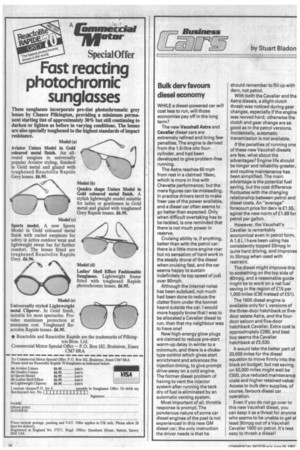Bulk dery favours diesel economy
Page 64

If you've noticed an error in this article please click here to report it so we can fix it.
WHILE a diesel-powered car will cost less to run, will those economies pay off in the long term?
The new Vauxhall Astra and Cavalier diesel cars are extremely refined and bring few penalties. The engine is derived from the 1.6-litre ohc four
cylinder, and had been • developed to give problem-free running.
The Astra reaches 60 mph from rest in a claimed 18sec, which is more in line with Chevette performance; but the mere figures can be misleading. In practice drivers tend to make freer use of the power available, and a diesel car often seems to go better than expected. Only when difficult overtaking has to be tackled, is one reminded that there is not much power in reserve.
Cruising ability is, if anything, better than with the petrol car: there is a little more engine roar but no sensation of hard work in the steady drone of the diesel when cruising fast, and the car seems happy to sustain indefinitely its top speed of just over 90mph.
Although the internal noise has been subdued, not much had been done to reduce the clatter from under the bonnet heard outside the car. I would more happily know that I was to be allocated a Cavalier diesel to run, than that my neighbour was to have one!
New high-energy glow plugs are claimed to reduce pre-start warm-up delay in winter to a minimum, and there is a choketype control which gives start enrichment and advances the injection timing, to give prompt drive-away on a cold engine. The former diesel problem of having to vent the injector system after running the tank dry of fuel is eliminated by an automatic venting system.
Most important of all, throttle response is prompt. The ponderous nature of some car diesel engines of the past is not experienced in this new GM diesel car; the only instruction the driver needs is that he
should remember to fill up with derv, not petrol.
With both the Cavalier and the Astra diesels, a slight clutch thrash was noticed during gear changes, especially if the engine was revved hard; otherwise the clutch and gear change are as good as in the petrol versions. Incidentally, automatic transmission is not available.
If the penalties of running one of these new Vauxhall diesels are few, what about the 'advantages? Engine life should be longer and reliability greater, and routine maintenance has been simplified. The main advantage is the potential fuel saving, but the cost difference fluctuates with the changing relationship between petrol and diesel costs. An "average" forecourt price for dery is £1.55, aginst the new norm of £1.69 for petrol per gallon.
However, the Vauxhall's Cavalier is remarkably economical even in petrol form. A 1.6 L I have been using has consistently topped 33mpg in quite hard driving, and improves to 35mpg when used with restraint.
The diesel might improve this to something on the top side of 40mpg, and a reasonable guide might be to work on a net fuel saving in the region of £15 per 1,000 miles (C36 instead of £51).
The 1600 diesel engine is available only for L versions of the three-door hatchback or fivedoor estate Astra, and the fourdoor saloon and five-door hatchback Cavalier. Extra cost is approximately £260, and best buy seems the Cavalier hatchback at £5,530.
It would take the better part of 20,000 miles for the diesel equation to move firmly into the black on budget; but net saving on 50,000 miles might well be £500, plus reduced maintenance costs and higher retained value. Access to bulk dery supplies, of course, favours diesel car operation.
Even if you do not go over to this new Vauxhall diesel, you can keep it as a threat for anyone who seems to be unable to get at least 30mpg out of a Vauxhall Cavalier 1600 on petrol. It's less easy to thrash a diesel!


































































